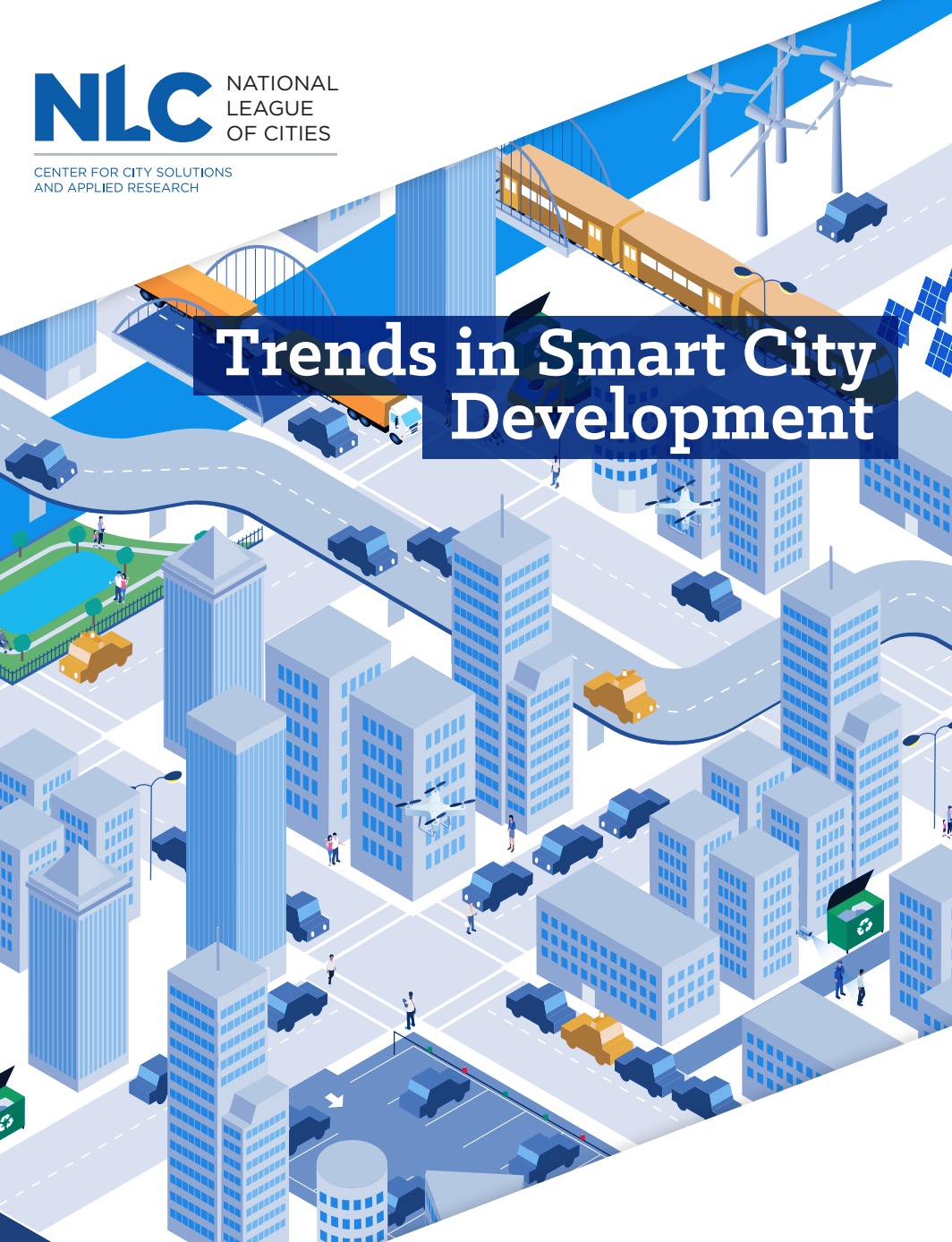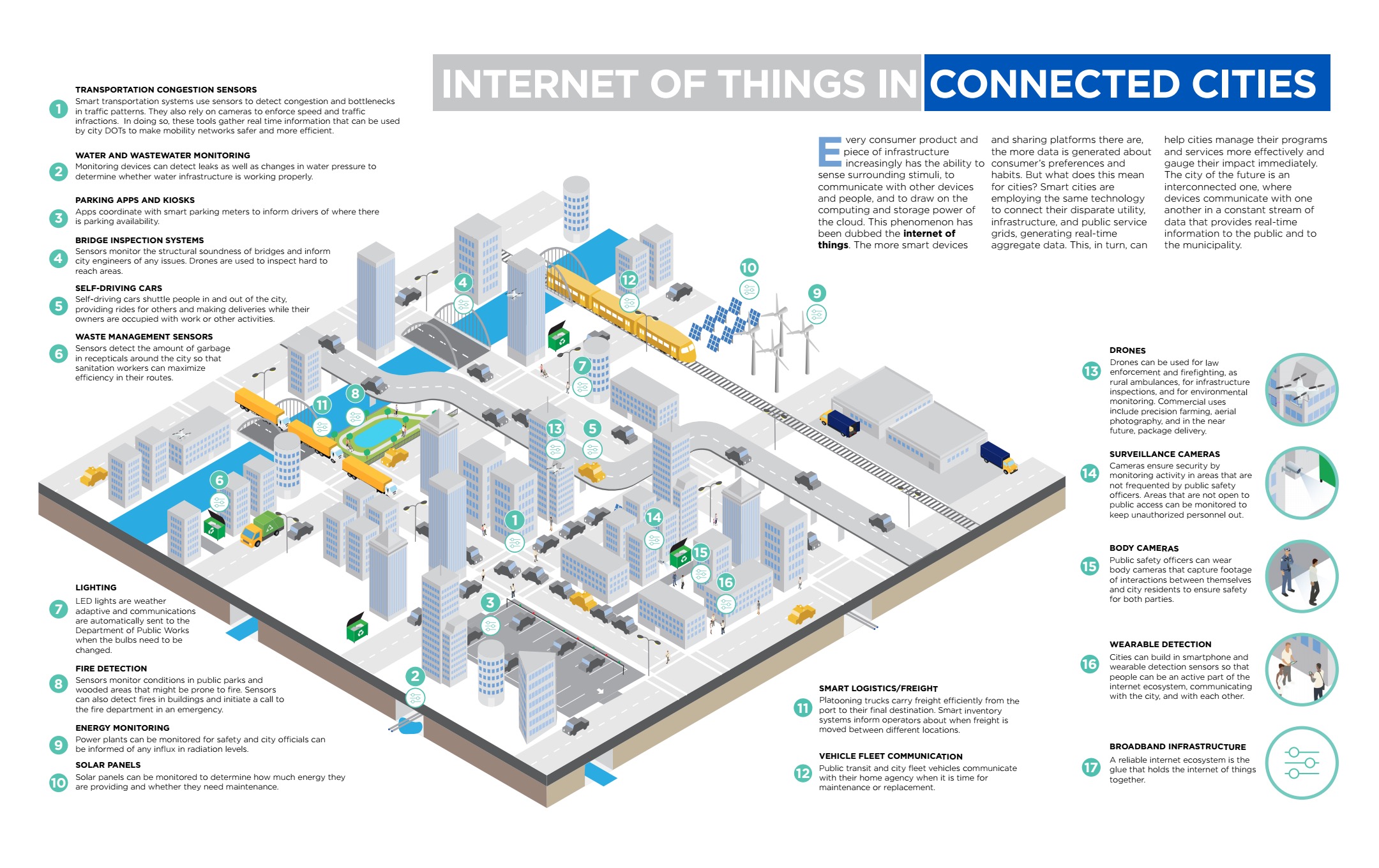NATIONAL LEAGUE OF CITIES (NLC)
CENTER FOR CITY SOLUTIONS AND APPLIED RESEARCH
Executive Summary
 This report examines the meanings and practices associated with the term ‘smart cities.’ Smart city initiatives involve three components: information and communication technologies (ICTs) that generate and aggregate data; analytical tools which convert that data into usable information; and organizational structures that encourage collaboration, innovation, and the application of that information to solve public problems.
This report examines the meanings and practices associated with the term ‘smart cities.’ Smart city initiatives involve three components: information and communication technologies (ICTs) that generate and aggregate data; analytical tools which convert that data into usable information; and organizational structures that encourage collaboration, innovation, and the application of that information to solve public problems.
Hence, a smart city is a city that has developed some technological infrastructure that enables it to collect, aggregate, and analyze real-time data and has made a concerted effort to use that data to improve the lives of its residents. Such an effort should include explicit policy recommendations regarding ‘smart’ infrastructure and data, a functioning administrative component, and some form of community engagement.
To better understand smart cities in practice, this report outlines smart city initiatives in five cities. For each city, the report focuses on the organization of the initiatives, the policy and administrative components guiding the initiatives, and community engagement around smart development. The findings are summarized here:
- Chicago, IL: In 2012, Chicago Mayor Rahm Emanuel signed the city’s open data policy. It created an open data platform and mandated cross-functional collaboration, all managed by the Department of Innovation and Technology. That policy and the administrative structure it created positioned the city to partner with universities and the private sector on sensor projects like the Array of Things, which aims to collect and disseminate real-time data, thereby catalyzing innovation in the city.
- Philadelphia, PA: In 2011, Mayor Michael Nutter issued an executive order establishing the Office of Innovation and Technology (OIT) of Philadelphia. The creation of this office allowed for city leaders to have a more hands-on approach to ICT initiatives in the city. City oversight as well as partnerships with private and public entities has moved Philadelphia toward many smart city concepts.
- Charlotte, NC: In 2011, Envision Charlotte was established as a public-private collaboration (PPC) to help the city sustain its accelerating population growth. As a new organization, Envision Charlotte is currently working on ways to reduce energy use in commercial buildings through behavioral changes.
- San Francisco, CA: San Francisco has a history of strong leadership interest in making the city smart and sustainable through environmental and transportation improvement measures. Furthermore, San Francisco’s OpenData initiative, launched in 2009, supports smart cities initiatives that aim to meet greenhouse gas reduction goals and improve and increase public transportation service.
- New Delhi, India: New Delhi is in the initial planning stages of its smart cities initiative, which is part of the broader overarching goal of India’s smart cities program that ties into the United Nation’s Sustainable Development Goals. The city is following the lead of the nation’s existing environmental policy and land pooling policies.
While ICT infrastructure makes the technological aspects of smart development easier, the organizational components remain challenging. Cities should work to lay the groundwork for smart development. Establishing the necessary policies (such as open data and e-governance policies) and administrative capacity (for example, a department for innovation and technology) in advance will better position cities to take advantage of these new technologies.
Rather than looking for solutions first, cities should consider the outcomes they want to achieve. They should find out what their residents and local businesses want to see happen, and turn those desires into clearly defined objectives before proceeding with smart initiatives. A city’s existing comprehensive, transportation, and sustainability planning documents can help guide the establishment of goals. Conversely, smart cities can help to accelerate the goals outlined in those documents. Looking to other cities for frameworks and best practices can also provide valuable guidance, but not a set of instructions.
Leveraging technology to improve the sustainability and equity of cities is a powerful idea with enormous potential. Those ambitions, however, should be tempered by realism. Cities should critically examine smart city technologies and the rhetoric that surrounds them. Cities should be mindful, too, of the organizational challenges that accompany smart city implementation. Functional silos, the challenges of cross-sector collaboration, and political gridlock will not disappear with the arrival of these new ‘smarter’ systems. If these challenges can be overcome, then smart city development can prove beneficial.
INTERNET OF THINGS IN CONNECTED CITIES
CLICK TO ENLARGE
Download full version (PDF): Trends in Smart City Development
About the National League of Cities (NLC)
www.nlc.org
The National League of Cities (NLC) is dedicated to helping city leaders build better communities. Working in partnership with the 49 state municipal leagues, NLC serves as a resource to and an advocate for the more than 19,000 cities, villages and towns it represents.
Tags: ICTs, National League of Cities, NLC, Smart Cities







 RSS Feed
RSS Feed